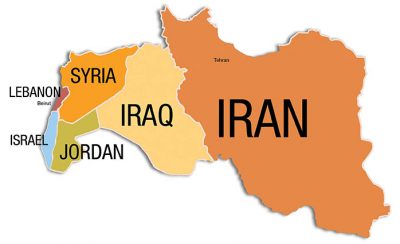×


We have detected your country as:
Please click here to go to the USA website or select another country from the dropdown list.
by: Ilse Strauss, BFP News Correspondent
 In 2012, The Jerusalem Post editor-in-chief Yaakov Katz and Israeli historian Yoav Hendel published a book on the covert war that has raged between the sons of Judah and the offspring of ancient Persia for over three decades. They called the book Israel vs. Iran: The Shadow War.
In 2012, The Jerusalem Post editor-in-chief Yaakov Katz and Israeli historian Yoav Hendel published a book on the covert war that has raged between the sons of Judah and the offspring of ancient Persia for over three decades. They called the book Israel vs. Iran: The Shadow War.
In February, the war came out of the shadows. Iran fired the first “shot” by launching a drone from Syria into the Promised Land. Israel eliminated the drone, took out the launch site and struck eight Syrian and four Iranian military targets. In return, fragments of an exploding missile from a hail of anti-aircraft fire downed an F-16 in the Lower Galilee.
In the aftermath of the first overt military action between Jerusalem and Tehran, international media speculated whether the incident marked the beginning of open war between the two forces. While the question of whether the Promised Land’s northern border will serve as the battlefield for the first Israel–Shia war is undoubtedly a crucial one, another aspect begs clarification: what is Iran—a country located some 1,800km (1,118 mi) away—doing on Israel’s doorstep?
Iran has been forthright about its desire to see the Jewish state annihilated and the leading role it hopes to play in that destruction. While Tehran develops long-range ballistic weapons in contravention of international sanctions, the distance between the Islamic Republic and the country it wishes to annihilate poses a challenge. Solutions to this problem include gaining a foothold closer to Israel’s borders or engaging a proxy willing to do the dirty work. Iran has pursued both options.
Iran, Syria and the Lebanese terror group, Hezbollah, form the Axis of Resistance, a Shi’ite alliance opposing Israeli and US interests in the Middle East. During the seven years of civil war in Syria, Tehran’s military and financial support have proven instrumental in helping President Bashar al-Assad gain an upper hand in the conflict. For Iran, the victory of its key regional ally was not negotiable.
Yet Tehran’s involvement went beyond assisting an ally. Syria proved the ideal spot for Iran to set up camp and the Islamic Republic used its six years of involvement in the war to build a military presence on the Jewish state’s doorstep. Evidence of Tehran’s long-term plan surfaced last year, when BBC published footage of the Iranians building a permanent military compound south of Damascus to house their soldiers and vehicles.
At the same time, Iran helps its terror proxy and third leg of the axis, Hezbollah, buttress its position in south Lebanon. The Shi’ite terror group reportedly has 150,000 missiles trained on Israel. Moreover, Tehran uses Syria as a funnel to stock Hezbollah’s arsenal with additional “game-changing” weapons and assists the terror group in the construction of underground weapons manufacturing sites.
For its part, Israel has made it clear that it will not allow Iran to establish a permanent military outpost on its borders or build a Shi’ite land corridor from Tehran to Beirut. Moreover, Jerusalem has warned repeatedly that Tehran’s attempts to encircle the Promised Land through its terror proxies and now its presence in Syria will lead to an escalation.
February’s clash arguably marks the first chapter of a new reality. The war in Syria is in its final days, with Assad in control of the majority of the country and poised to win. Yet while Tehran succeeded in its aim of ensuring the regime’s triumph, the Iranians have still not packed their bags and headed home. In fact, they appear more determined than ever to remain on Israel’s horizon.
As the situation teeters on the abyss of full-scale escalation, Russia holds the power to curb Iran’s ambitions. One of Assad’s main allies during the war, Moscow, rushed to the Syrian president’s aid in 2015 when his regime faced defeat. In the three years since, Russia has invested itself heavily to ensure Assad’s victory, gain a foothold in the region and protect its interests and facilities in the country. Moscow is about to achieve its objective of a stable, Assad-ruled Syria. Moreover, as the dominant power and master of the skies, it arguably seeks to avoid a new war.
Since Russia’s arrival in the neighborhood, Jerusalem and Moscow have collaborated closely to avoid inadvertent run-ins and Prime Minister Netanyahu and President Putin have reportedly discussed Israel’s Syrian concerns at length. Yet Russia did not stop Iran from launching its drone. Moreover, Moscow publicly condemned the Jewish state’s response to the invasion.
At press time, the situation continues to unfold. Yet one reality stands: the territory across Israel’s northern border serves as the stage for a bevy of international role-players, each vying for its own agenda, none of which are in the Jewish state’s best interest. Only time will tell if the Shadow War has truly ended and open battle between the children of Israel and the offspring of Persia has begun.
Photo Credit: Jim Vallee/shutterstock.com
All logos and trademarks in this site are property of their respective owner. All other materials are property of Bridges for Peace. Copyright © 2024.
Website Site Design by J-Town Internet Services Ltd. - Based in Jerusalem and Serving the World.